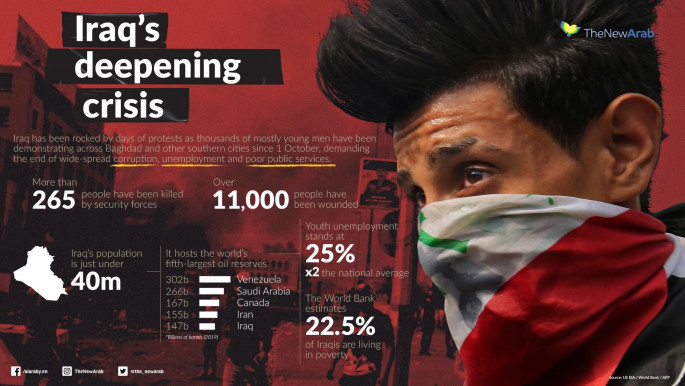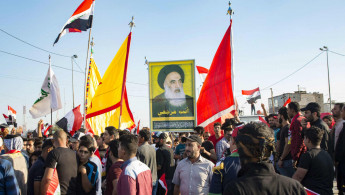Ayatollah Sistani denies participating in Iraq agreement to end protests
Iraq's most influential Shia Muslim cleric has rejected reports of his involvement in a deal to end mass protests and shore up the rule of Prime Minster Adel Abdul Mahdi.
3 min read
Sistani has previously called on the government to listen to protesters' demands [AFP]
Iraq's foremost Shia Muslim religious authority has denied involvement in a cross-factional agreement to crush protest and secure the rule of Prime Minster Adel Abdul Mahdi.
Grand Ayatollah Ali al-Sistani has previously sided with the demonstrators, calling on the government to meet protesters' demands in a Friday speech, but had been rumoured to be involved in Saturday's agreement to end the mass protest movement.
Initial reports indicated that meetings surrounding the deal led by influential Iranian figure General Qasem Soleimani were attended by the ayatollah's son, Mohammed Ridha al-Sistani.
But in a statement by Sistani's office circulated by Iraqi media on Saturday, the country's most important Shia cleric rejected reports of his involvement in the controversial agreement.
"The position of the religious authority [Sistani] towards the popular protests and how to handle them is to respond to the protesters' demands, as was clearly stated in the Friday sermon," read the statement.
AFP had previously reported that popular Shia cleric Moqtada al-Sadr had also been party to the negotiations. Sadr has also previously expressed support for the demonstrations, but has yet to make a statement on the deal.
The closed-door meetings, said to have resulted in a deal to keep the unpopular prime minister in power and put an end to the near-nationwide protests, were reportedly organised by Soleimani, commander of the Iranian Revolutionary Guard Corps' foreign operations arm, the Qods Force.
Alongside endemic corruption, widespread unemployment and a crumbling economy, Iraqis have also expressed their ire for foreign influence in the country - both the political system crafted by the United States during its occupation of Iraq and the lurking hand of Tehran in Iraqi affairs.
 |
| Read more: Iraq and Lebanon protests: Iran watches in the wings |
Soleimani and the Iran-linked Hashd al-Shaabi militias are synonymous with that influence.
Sistani on Friday warned of foreign meddling in Iraq, urging political factions to avoid deadly "infighting".
"No person or group, no side with a particular view, no regional or international actor may seize the will of the Iraqi people and impose its will on them," the cleric said during his weekly sermon.
As reports of the agreement to end the mass protests by any means necessary emerged on Saturday, security forces began to sweep the streets of protest hubs in the capital Baghdad and the southern city of Basra in an attempt to force out demonstrators.
At least eight people were killed overnight in the clashes, prompting Amnesty International to urge the government to "rein in" its security forces to prevent a "bloodbath".
"This is turning into nothing short of a bloodbath - all government promises of reforms or investigations ring hollow while security forces continue to shoot and kill protesters," Heba Morayef, Amnesty's Middle East and North Africa Director, said in a statement on Saturday.
"The government of Iraq has a duty to protect people's right to live, as well as to gather and express their views. This bloodbath must stop now, and those responsible for it must be brought to justice."
The human rights group earlier this week condemned Iraq for its alleged use of military-grade tear gas grenades to disperse protesters.
Reportedly aimed directly at demonstrators' heads at "point-blank range", the Serbian- and Iranian-produced grenades have caused multiple horrific deaths and "gruesome" injuries.





 Follow the Middle East's top stories in English at The New Arab on Google News
Follow the Middle East's top stories in English at The New Arab on Google News
![Both Hamas and the Palestinian Authority welcomed the ICC arrest warrants [Getty]](/sites/default/files/styles/image_330x185/public/2024-11/GettyImages-2178351173.jpg?h=199d8c1f&itok=TV858iVg)

